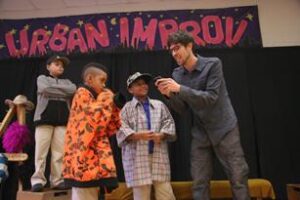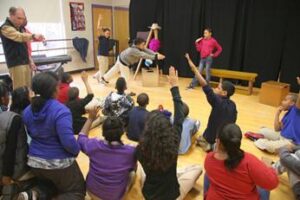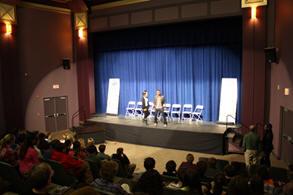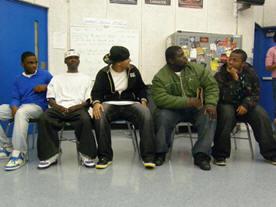 Urban Improv uses interactive theater workshops and improvisation to teach violence prevention, conflict resolution, decision making, and impulse control.The program’s innovative curriculum helps students deal creatively with major issues in their lives; it is truly a rehearsal for life.
Urban Improv uses interactive theater workshops and improvisation to teach violence prevention, conflict resolution, decision making, and impulse control.The program’s innovative curriculum helps students deal creatively with major issues in their lives; it is truly a rehearsal for life.
Vision
Urban Improv addresses the issue of social emotional learning (SEL) using improvisational theatre to practice problem-solving skills such as anticipating consequences, considering alternative perspectives, developing quick and flexible thinking, controlling impulses, and managing affect. Urban Improv empowers youth to constructively navigate real issues in their lives.
The proven results of SEL include positive social behavior, fewer conduct problems, decreased emotional stress and improved academic achievement. Implementation of SEL programs in schools provides a foundation for creating a safe learning environment where all students can succeed. Effective programs include multi-component school-based interventions that focus on teaching students skills to enhance SEL competencies as well as academic learning. These critical SEL competencies involve skills that enable students to calm themselves when angry, initiate friendships and resolve conflicts respectfully, make ethical and safe choices and contribute constructively to their community.
Improvisation as a Teaching and Learning Strategy
Urban Improv’s ensemble of artist/educators use improvisation because it is spontaneous. The content of scenes created arises from social emotional learning addressing the issues and concerns of workshop students. The students then become creators in the work thus affirming and empowering the self.
One of the fundamental qualities about Urban Improv is that they have these series of mini musicals/plays AND they are tied to improvisation – improvisation with a container. Part of what is really cool about improvisation is that there isn’t necessarily a final project – people, and kids, get better at the process the more it is experienced.
The project is the experience. The scenarios continue to be played out and experienced; even different versions and outcomes can be considered, whether through conversation or in thought (even in dreams). Extreme listening is required as well as self-expression, and the observation of the process is almost just as valuable as participating, because it becomes a way to think and learn more fully about the motivations of different characters and why and how things are done and said in certain ways. It teaches empathy and that there’s complexity in why a person acts in a certain way. It really is a rehearsal for life.

History
In 2017 Urban Improv is celebrating its 25th anniversary and the 75,000 students who have been empowered to make positive choices in their lives through participation in our “rehearsal for life” programs.
In 1992, Urban Improv’s founders established our workshop programs for Boston students. Kippy Dewey, a founder and current Urban Improv Executive Director, had studied with the Living Stage Theatre Company, the preeminent theatre for social change in the US. Ms. Dewey, who had already created two theatrical programs for young people, believed and continues to believe that theater is transformative. Using her training with the Living Stage, she created an education program for under-served Boston youth. Ms. Dewey hired five individuals with both acting and educational experience to begin Urban Improv’s programs.
Once the five Actor/Educators learned the Living Stage techniques of music, participatory theater and creation, they collaborated with Boston teachers and community educators to focus the first nine workshops for 100 4th grade students to address needed decision-making, conflict resolution, problem solving, cooperation, leadership, and values clarification skills. Teaching students these competencies, Urban Improv’s creators established one of the first social/emotional learning (SEL) programs in the country.
Urban Improv’s workshops soon expanded to Boston’s upper elementary school grades and then middle school and high school. In 2005, the organization established Youth Unscripted, a program that provides SEL skills and leadership training to high-schoolers. Now Urban Improv provides its programming to over 5,000 students, teachers, parents and community groups annually.
Activities
Using interactive theater as a powerful medium for change, participants draw from real life experiences and learn to craft and act in their own interactive dramatic presentations.
The School Workshop Series serves 4th-8th grade classes sequentially in seven Boston partner schools. Each participating classroom engages in 45 workshops over five years (nine 75 minute sessions per year). This year over 1,200 students from Dorchester, Roxbury, Mission Hill, Mattapan and Jamaica Plain are participating in workshops comprising themes relating to “Empowerment, Empathy, Self-Expression, Self -Respect and Violence Prevention.”
Each workshop consists of a three step engagement process:
1) Introductory music and song for students
2) An interactive performance with actors and students, and
3) Student creation of scenes and characters. The Actor/Educators present a short scene addressing the week’s issue such as “Bullying, Cyber Bullying, Peer Pressure, Racism, Gangs, Addiction, Homophobia and Violence Prevention.” Students take over key roles making their own choices about the scene’s direction and outcomes. Themes and scenes are age appropriate.
The series includes three semesters (144 workshops per semester, 9 workshops per classroom) during the school year. Sixteen classrooms comprising 25 students each, attend. Each 75 minute session begins with a song based on the theme that will be addressed that day, followed by warm up exercises, and then a short scene or scenes presented by five Actor/Educators including the director. At various pivotal moments during the scene/scenes the director will tell the Actor/Educators to freeze and then ask for comments from the students about what has happened and the choices the students would make. Students are then asked to replace the Actor/Educators in the scene/s and make decisions about outcomes.
The final piece of the presentation is the students creating their own scenes. Continuous themes throughout all workshops are “Self Esteem, Consequences and Violence.” Our final workshops consist of review of topics, closure and administration of surveys to teachers and students.
In order to reinforce students’ SEL competencies the Actor/Educators begin the School Workshop Series each year with an introductory workshop for teachers, school counselors and administrators to present the themes for the year and for school staff to learn how to extend learning in their classrooms and school community. We also have introductory presentations for the parents and teachers of children who attend our 4th – 8th grade workshops.
Curriculum examples for 4th – 8th Grade Workshops
4th Grade – Friendship, Imagination, Self-Esteem, Fear. Peer Pressure, Conflict, Family and Bullying
5th Grade – Take the Challenge, Scapegoat/Acceptance, Conflict, Physical Challenges, Snitching, Prejudice, Peer Pressure, Coping and Resiliency
6th Grade – Responsibility, Peer Pressure, Bullying/Bystander, Electronic Addiction, Personal Boundaries, Prejudice/Homophobia, Conflict and Ostracism
7th Grade – Bystander/Choosing to Participate, Friendship/Second Chances, Conflict/DYS, Cyber-bullying, Prejudice, Communication
8th Grade – Gangs, Drugs, Bystanders, Teen pregnancy, Racism, Homophobia and Changing Home Life

Assemblies
One to two workshops for schools and communities throughout Massachusetts and beyond, which address issues challenging schools and communities. The Assemblies address important topics and issues pertinent to child development and health and school and community safety. They open the door to healthy discussion and reinforce pro-social behaviors through Urban Improv’s interactive and engaging improvisational methods. Schools choose which topics they wish addressed. (See above listing of topics.)

Youth Unscripted
Youth Unscripted is Urban Improv’s after school program for high school students that uses the same improvisational theater process as the Workshop Series. During the school year Youth Unscripted meets after school once a week or 16 weeks and introduced inner Boston high school students to the Urban Improv method and helps them become peer leaders in their schools and communities. After warm up exercises, students focus on themes such as: “Surviving the
Streets, Gangs, Sexual Harassment, Dating Violence, Drugs, Stereotypes/Confronting the “isms,” part 1, Stereotypes/Confronting the “isms” part 2, Communication with Police and other Authority Figures, Teen Pregnancy, Self-Esteem, Consequences, Conflict Resolution and Violence.”
Working with Youth Unscripted has definitely been an exceptional experience. The team of youth, with the direction of Merle, continues to awe me. Their acting skills are outstanding, and they understand how important this work is for young adults. This model is one of the most effective ways to reach underserved populations and it needs to be expanded. It helps nurture youth into responsible members of their communities. I will continue to be an example, and an advocate, for Youth Unscripted. Darrus E. Sands, Coordinator for the Choose Not To Abuse Program at the Boston Public Health Commission

Mentoring
Urban Improv’s Mentoring Program matches 4th and 5th grade Workshop series students with caring adults for five plus years. Mentors and mentees participate in one-to-one and group educational, cultural and civic activities that also teach SEL skills. Started in 1999 as an adjunct to Urban Improv, this program continues the mission to help Boston young people deal creatively with issues in their lives and to help achieve established goals.
Audience/s served
All of Urban Improv’s programs serve students in 4th – 12th grades and their families. The Workshop Series, Youth Unscripted and Mentoring serve low income minority students attending schools in Dorchester, Mattapan, Mission Hill, Jamaica Plain and Roxbury, MA. The Assemblies serve students, teachers and parents.
Successful Impact
Since its beginnings 25 years ago Urban Improv has presented its SEL curriculum to 70,000 students attending 125 schools.
The Workshop Series curriculum has been evaluated by independent researchers who stated at the end of their 3 year outcome study, “Urban Improv, the school-based interactive drama program, teaches decision-making, conflict resolution, problem solving, cooperation, leadership, and values clarification skills.” Youth Unscripted was evaluated in a 2 year assessment.
In 2014 Urban Improv developed and implemented an ongoing evaluation system to consistently assess the impact of its programs on participating students, including student surveys, teacher surveys and focus groups with 8th grade students who have participated in the program for 3 or more years.
Four hundred students from BTU, Murphy, St Patrick’s and Mission Hill participated in the 2016 fall written survey. Each question began with “After coming to Urban Improv I strongly agree, agree, disagree or strongly disagree.”
73% agreed or strongly agreed –I used my imagination to solve a problem;
93% –It is important to control my anger;
93% – I learned to better understand other people’s opinions;
86% – I feel more hopeful that things will work out when I have a problem;
73% – I am more patient with other kids in my class;
81% – I can create more than one solution to a problem;
93% – I learned that to make a good decision, it is important to think about the consequences;
77% – I can better express my ideas and feelings;
92% – I learned about how my words and actions could make someone feel bad; and
78% – I have positively resolved conflict with classmates, friends or family members.
Fifteen teachers from the same four schools responded.
100% strongly agreed or agreed that Urban Improv was beneficial for students,
93% – my class showed increased problem solving skills;
79% – Urban Improv helped build students impulse control skill; and
100% – Urban Improv helped build my students empathy.
Findings/Key Themes:
- The experience of participating in Urban Improv was valuable. Students reported looking forward to attending Urban Improv. They remembered many topics and actors from their workshops. When asked about friends who did not attend UI, students reported that those friends react less productively to situations and/or come to them for advice.
- Multi-year structure of Urban Improv’s 9-week workshops was beneficial and appreciated by participants. Students reported feeling embarrassed, scared and shy during the first workshops in 4th grade but then become more comfortable and confident as time went on. Students also reflected on the importance of the curriculum becoming more “mature” as they got into middle school grades.
- Students would like to address what happens after Urban Improv ends. Since students found their time at Urban Improv useful there was discussion about what happens after it ends in 8th grade. Students commented that they wanted to continue participating in 9th grade and beyond. Also students suggested a scene about leaving their schools and going to high school.
Recommendations for replication and/or adaptation
The Urban Improv Educational Video is an innovative teaching tool for youth educators and healthcare professionals. It covers topics including racism, bullying, peer pressure, teen pregnancy, and homophobia, with a target audience of middle and high school students, ages 12-18. The video includes a companion Teacher’s Resource Guide.
Taped in front of a live audience of young people, the video is based on Urban Improv’s Emmy award-winning TV show, “Re: Action!” The series features 13 vignettes performed by professional actors using our powerful methodology to set up scenes of real-life conflicts. As the tension builds, the director freezes the action and invites students to enter the drama and act out their own resolutions. Each skit is followed by an in-depth group discussion.
The structure of the tapes allows flexibility in the classroom and offers interactive opportunities for students.The video scripts were developed in consultation with a network of nationally recognized educators and health professionals, including: Dr. Sara Lawrence Lightfoot, Professor, Harvard School of Education; Dr. Bessel van der Kolk, Professor of Psychiatry, Boston University and Medical Director, Trauma Center at Justice Resource Institute; Deborah Meier, Ph.D., Founding Principal, Mission Hill School, Boston; Emily Hewitt, Teacher, Madison Park High School, Boston.
The video is for youth educators and healthcare professionals. It costs $150 and can be ordered on the Urban Improv website under “Programs.”
Professional Development: Urban Improv is also considering the development of a teacher training packet for workshop and assembly programs to include: information about the what/why/how of improvisation; suggested pre-activities (warm ups); themes, scenes, and post activities (discussions and student created scenes)
Contact info
www.urbanimprov.org, jjirard@rehearsalforlife.org
Rehearsal for Life, Inc.
655 Centre Street,,Box 300037
Jamaica Plain, MA 02130
Phone: 617-524-7045
